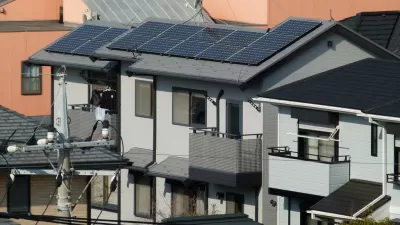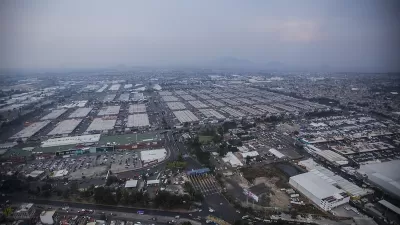New proposals targeting customers could derail solar energy’s future in the state.

Michigan is the latest state dealing with threats to net metering, a policy that allows energy customers with solar panels to sell extra power back to the grid. In Michigan, DTE Energy currently pays full retail price for this surplus power.
But, the company is seeking changes that renewable energy advocates say will slow down solar expansion in the state. It wants to reduce the payment rate by 75 percent. In addition, it is proposing a monthly fee for solar energy customers. “DTE declined to say what the impact of its proposal would be for solar panel owners, but Vote Solar estimates that the proposed changes would mean a homeowner with a 5 kilowatt system loses about $498 per year,” reports Dan Gearino.
Solar is starting to take off in Michigan so these proposed changes could severely hamper its growth. Gearino says Nevada dropped its net-metering rates in 2015 with severe consequences:
Solar growth came to a near-standstill, and major solar installers, including Sunrun and SolarCity, announced they were stopping local operations, closing offices and cutting hundreds of jobs. The backlash forced the state to reverse course in 2017, and Republican Gov. Brian Sandoval signed a bill restoring net-metering payments.
What is happening in Michigan is occurring in other states, as utility companies respond to what they perceive to be a threat to their bottom lines. “What the discussion lacks, [David] Littell said, is a model policy that both utility groups and clean energy advocates will concede is fair,” adds Gearino.
FULL STORY: High-Stakes Fight Over Rooftop Solar Spreads to Michigan

Study: Maui’s Plan to Convert Vacation Rentals to Long-Term Housing Could Cause Nearly $1 Billion Economic Loss
The plan would reduce visitor accommodation by 25,% resulting in 1,900 jobs lost.

North Texas Transit Leaders Tout Benefits of TOD for Growing Region
At a summit focused on transit-oriented development, policymakers discussed how North Texas’ expanded light rail system can serve as a tool for economic growth.

Why Should We Subsidize Public Transportation?
Many public transit agencies face financial stress due to rising costs, declining fare revenue, and declining subsidies. Transit advocates must provide a strong business case for increasing public transit funding.

How Community Science Connects People, Parks, and Biodiversity
Community science engages people of all backgrounds in documenting local biodiversity, strengthening connections to nature, and contributing to global efforts like the City Nature Challenge to build a more inclusive and resilient future.

Alabama: Trump Terminates Settlements for Black Communities Harmed By Raw Sewage
Trump deemed the landmark civil rights agreement “illegal DEI and environmental justice policy.”

Dear Tesla Driver: “It’s not You, It’s Him.”
Amidst a booming bumper sticker industry, one writer offers solace to those asking, “Does this car make me look fascist?”
Urban Design for Planners 1: Software Tools
This six-course series explores essential urban design concepts using open source software and equips planners with the tools they need to participate fully in the urban design process.
Planning for Universal Design
Learn the tools for implementing Universal Design in planning regulations.
City of Santa Clarita
Ascent Environmental
Institute for Housing and Urban Development Studies (IHS)
City of Grandview
Harvard GSD Executive Education
Toledo-Lucas County Plan Commissions
Salt Lake City
NYU Wagner Graduate School of Public Service





























